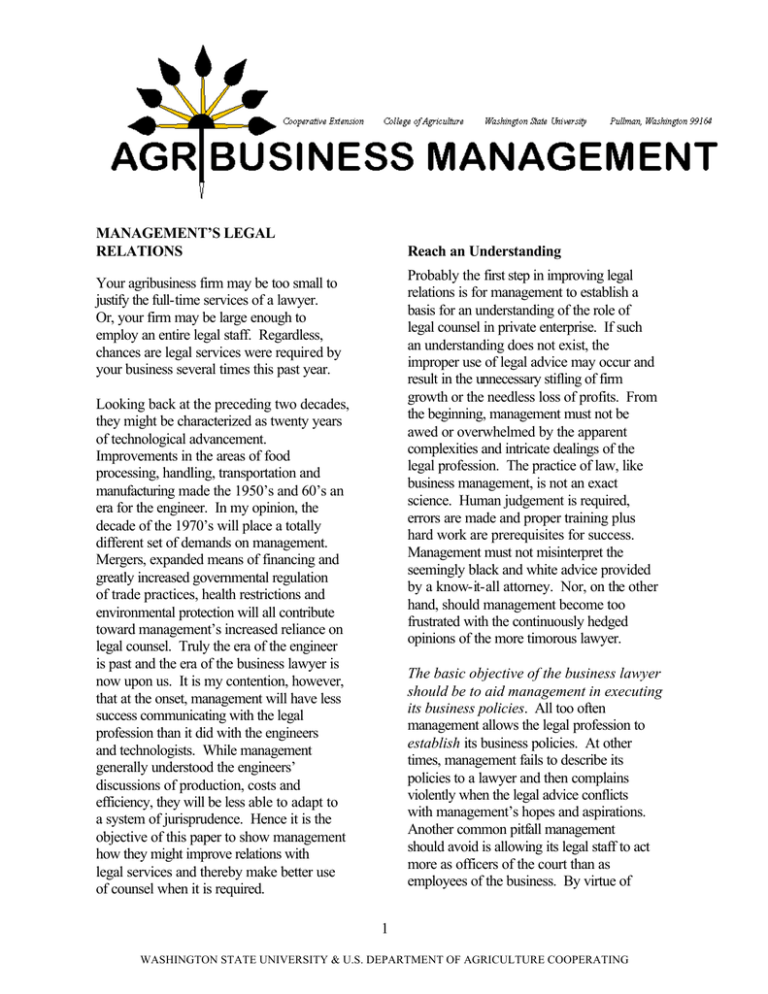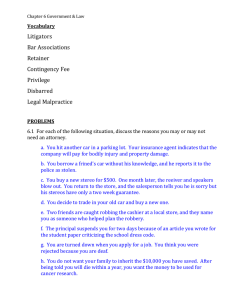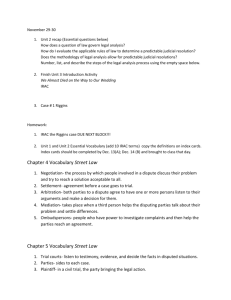Probably the first step in improving legal
advertisement

MANAGEMENT’S LEGAL RELATIONS Reach an Understanding Probably the first step in improving legal relations is for management to establish a basis for an understanding of the role of legal counsel in private enterprise. If such an understanding does not exist, the improper use of legal advice may occur and result in the unnecessary stifling of firm growth or the needless loss of profits. From the beginning, management must not be awed or overwhelmed by the apparent complexities and intricate dealings of the legal profession. The practice of law, like business management, is not an exact science. Human judgement is required, errors are made and proper training plus hard work are prerequisites for success. Management must not misinterpret the seemingly black and white advice provided by a know-it-all attorney. Nor, on the other hand, should management become too frustrated with the continuously hedged opinions of the more timorous lawyer. Your agribusiness firm may be too small to justify the full-time services of a lawyer. Or, your firm may be large enough to employ an entire legal staff. Regardless, chances are legal services were required by your business several times this past year. Looking back at the preceding two decades, they might be characterized as twenty years of technological advancement. Improvements in the areas of food processing, handling, transportation and manufacturing made the 1950’s and 60’s an era for the engineer. In my opinion, the decade of the 1970’s will place a totally different set of demands on management. Mergers, expanded means of financing and greatly increased governmental regulation of trade practices, health restrictions and environmental protection will all contribute toward management’s increased reliance on legal counsel. Truly the era of the engineer is past and the era of the business lawyer is now upon us. It is my contention, however, that at the onset, management will have less success communicating with the legal profession than it did with the engineers and technologists. While management generally understood the engineers’ discussions of production, costs and efficiency, they will be less able to adapt to a system of jurisprudence. Hence it is the objective of this paper to show management how they might improve relations with legal services and thereby make better use of counsel when it is required. The basic objective of the business lawyer should be to aid management in executing its business policies. All too often management allows the legal profession to establish its business policies. At other times, management fails to describe its policies to a lawyer and then complains violently when the legal advice conflicts with management’s hopes and aspirations. Another common pitfall management should avoid is allowing its legal staff to act more as officers of the court than as employees of the business. By virtue of 1 WASHINGTON STATE UNIVERSITY & U.S. DEPARTMENT OF AGRICULTURE COOPERATING their training, some business lawyers are inclined to act as administrators of the law rather than interpreters of it. achieve both profit and growth. Managers know that being first in a new area, despite its risks, often offers a profit potential well beyond that which would accrue if one were to wait until after his competitors had taken the risks and the profits. As a result of the notable technological advances of the 1950’s and 60’s, managers are less suspicious of the new or untested. Change itself, is looked upon as an opportunitygenerating phenomena. Another common fault of management is to look upon its legal staff as an “omnipotent protector.” One slight legal misfire and the legal counsel is all but hung in effigy. Management must recognize that the business attorney is not all-seeing and allpowerful. It is not the business lawyer’s sole responsibility to avoid litigation or the wrath of government regulation. He should not be expected to win all lawsuits nor anticipate all legal contingencies. In short, a mutual understanding of the objective noted earlier will assist both management and the attorney in more efficiently performing their tasks. The inevitable conflict is, thereby, readily apparent. Attorneys tend to view risk and uncertainty as uncomfortable predecessors to trouble -- to be avoided or at least accepted reluctantly. To management, risk sometimes becomes synonymous with opportunity -- to be accepted when the potential rewards appear promising. In the end, it is the manager who controls the business, and this he can accomplish only by knowing when the lawyer’s judgment should be allowed to stop a new endeavor and when such legal counsel should be considered as no more important than that received from other firm personnel. The Inevitable Conflict The long run successful operation of the business is, or should be, a mutual goal of both its management and legal staff. In search of this common goal, however, it becomes almost inevitable that a conflict will arise. It behooves management to know of this conflict so that when it arises, its impact on the firm’s operations will be nominal. The Art of Brinkmanship There exists within our business community a persistent philosophy which can only be described as “brinkmanship.” This philosophy suggests that management is performing its tasks well when, and only when, the firm is operating at the brink of legal acceptance, e.g., when food quality standards are met, but just barely; where business contracts are met, but just barely; where legal restrictions on trade practices are adhered to, but just barely. As is indicated by this philosophy, some managers associate maximum performance with minimum adherence to the laws. No doubt, some cases do exist where brinkmanship has proven profitable. It is not, however, a philosophy which this The conflict of which I speak is an outgrowth of the training and natural orientation of managers and lawyers. A lawyer is trained to keep his client out of trouble. Therefore, his advice is designed to minimize risk and avoid the unknown. His judgement is based largely on existing practice and an analysis of past precedents. As such, any attempt by a business to try something new and untested is likely to be met with a considerable degree of hesitation and open suspicion by legal counselors. On the other hand, managers recognize that certain risks must be taken if the firm is to 2 author supports. Envision a blind man standing on the edge of the Grand Canyon - if he refuses to move, no harm will come to him, but one step in the wrong direction and it could spoil his whole day. This situation is not unlike a manager practicing the art of brinkmanship, i.e., bending the law to his selfish advantage while attempting not to break it. Not only will such a manager give his legal advisor ulcers, he is also inviting eventual disaster. To avoid this possibility, early in your relations with your attorney establish what is and what is not acceptable business conduct within existing laws. Once these guidelines are established, the areas of possible conflict between management and its legal service will be greatly reduced. fewer and fewer contracts were being requested and market volume soon dropped below acceptable levels. In business, anticipation is often better applied to marketing, technical, and logistical problems than to legal problems. Anticipating too many legal problems may have some detrimental side effects. For example, in the above illustration customers were being frightened away. In other cases, legal nit-picking may cause long delays which a firm, particularly an agribusiness firm, can ill-afford. Some Guidelines Most business attorneys will probably agree, in general, with what has been said above. Most would, however, hasten to add that hundreds of apparently healthy firms have failed because of their refusal to heed the advice of their legal counsel. And they may be correct in their assessment. No attempt is being made to diminish the importance of sound legal advice -- only to place that advice in proper perspective. The manager must retain his position as the major decision-maker. Legal advice should be sought and considered in much the same manner in which advice on other matters would be solicited from others on the manager’s supporting staff. Below I will list and describe nine guidelines for management to follow in improving their legal relations: Over Active Anticipators It is possible to become overly conscious of your firm’s legal arrangements. I once worked for a large regional agricultural marketing organization in the Midwest which had become so enamored with the activities of its legal staff that hardly was a decision made, no matter how minor, without prior legal approval. Every sentence of every purchase order and every grower contract, no matter how small, was thoroughly scrutinized by its legal eagles. Each time a contract came up for renewal, the customer was confronted with the firm’s legal staff attempting to renegotiate a more complex set of terms. If the customer survived this traumatic session of negotiations and walked away with a signed contract, chances are he was not very aware of what that contract really contained. The complex contracts were written in anticipation of all sorts of potential losses, regardless of how remote they might have been. Unfortunately, this rigorous legal activity soon began to scare away customers. While those contracts written were airtight from a legal point of view, 1. If your firm is about to launch a new program, a new product, or engage in a previously untried legal maneuver, have your attorney check things out in advance with the relevant government agencies or regulatory bodies. Then be prepared to accept the consequences of a negative answer. If you choose to proceed despite the potential legal 3 snarls, instruct your attorney to pitch in and earn his pay even if he doesn’t agree with your decision. 5. Do not try to deal with an opposing party’s attorney on your own. Such an encounter may appear to be a more efficient way of solving the problem, but it usually results in an invisible saving. If the opposition calls forward his legal staff, you do likewise. If your firm is too small to employ the needed legal talent, then contact the opposition in person and ask to settle the matter without the presence of either party’s attorney. 2. A good manager must be able to distinguish between that which is negotiable and that which is legally obtainable. If your lawyer can convince you that your firm has a clear legal right, then encourage him to pursue the issue. If, however, your firm’s rights appear to be unclear and perhaps weak, fairness and goodwill will likely be less costly than a long legal battle. Suggest to the other party that an equitable solution be reached on a manager-to-manager basis without the presence of an attorney. 6. Make your attorney a member of your firm’s total management team. Allow him to understand and pursue the firm’s business objective from the inside rather than as an outside observer. Evaluate his thinking and performance exactly as you would any other member of your management team. 3. In negotiating an agreement, consider carefully whether this should be done by a lawyer or by a layman. If the nature of the agreement truly demands rigorous legal involvement, then make sure legal service is provided. If, however, the agreement is relatively simple and free of contingencies, legal talent could probably be better used elsewhere. But remember -- as a manager the choice is yours to make. 7. Robert Townsend in his popular book titled Up the Organization suggests that a manager select the right lawyer, not the right law firm. I would support Townsend’s recommendation and add that when such a selection is made in conjunction with the sixth guideline, above, your firm’s legal relations will have a proper beginning. 4. If you employ more than one 8. Take the necessary time to learn attorney, do not automatically assume that their activities will be fully coordinated. Many lawyers, like managers, are individualists and prefer to work in a manner totally unlike that of their colleagues. If you have a large legal project under way, be sure that one lawyer, and only one, is assigned the responsibility of project completion and work coordination. Finally, don’t be afraid to inquire personally about the status of the project. enough about law to be able to provide at least some supervision over your attorney. Don’t accept his pat answers. Require that he show you the law and explain its meaning in layman’s language. Be sure to inquire about possible consequences but don’t become overly fearful of possible regulatory reprimands. It is not the intent of government agencies and regulatory bodies to destroy your business. Generally speaking, they deal fairly with those being regulated and do not file unwarranted 4 violations. To operate in continuous fear of, rather than respect for, the law is to incorporate such a degree of uncertainty into your business that little progress will result. Summary In the decade ahead, agribusiness managers will find themselves involved, to an increasing degree, with the legal aspects of their businesses. Proper legal support will be required if the business is to survive in today’s consumer-conscious environment. However, managers must be on guard so as not to release their control once their attorneys appear on the scene. Good legal relations require that managers work with and through their legal advisors to achieve existing business objectives. A series of guidelines are suggested such that improved legal relations may, hopefully, result. 9. If you have occasion to deal with governmental or regulatory agencies, don’t allow your legal staff to have complete autonomy in their activities. Stay in touch with both the agency and your staff. Both will appreciate your personal involvement. Ken D. Duft Extension Marketing Economist 5







